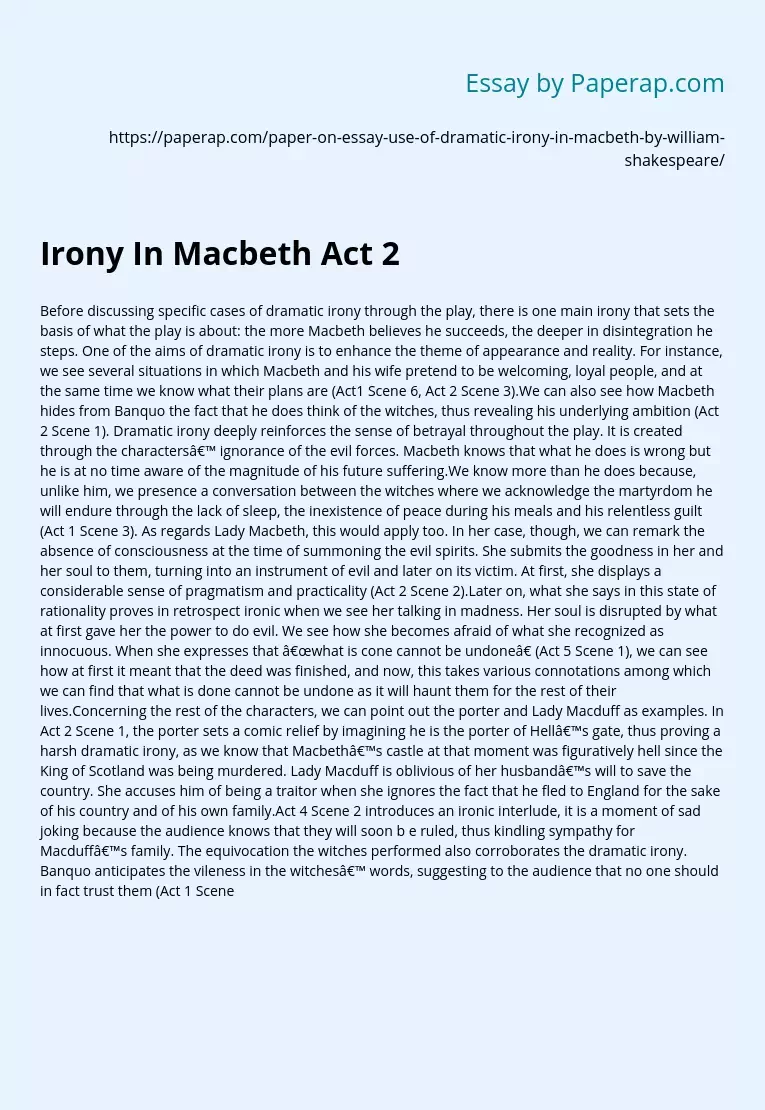Irony In Macbeth Act 2
Before discussing specific cases of dramatic irony through the play, there is one main irony that sets the basis of what the play is about: the more Macbeth believes he succeeds, the deeper in disintegration he steps. One of the aims of dramatic irony is to enhance the theme of appearance and reality. For instance, we see several situations in which Macbeth and his wife pretend to be welcoming, loyal people, and at the same time we know what their plans are (Act1 Scene 6, Act 2 Scene 3).
We can also see how Macbeth hides from Banquo the fact that he does think of the witches, thus revealing his underlying ambition (Act 2 Scene 1). Dramatic irony deeply reinforces the sense of betrayal throughout the play. It is created through the characters’ ignorance of the evil forces. Macbeth knows that what he does is wrong but he is at no time aware of the magnitude of his future suffering.We know more than he does because, unlike him, we presence a conversation between the witches where we acknowledge the martyrdom he will endure through the lack of sleep, the inexistence of peace during his meals and his relentless guilt (Act 1 Scene 3).
As regards Lady Macbeth, this would apply too. In her case, though, we can remark the absence of consciousness at the time of summoning the evil spirits. She submits the goodness in her and her soul to them, turning into an instrument of evil and later on its victim. At first, she displays a considerable sense of pragmatism and practicality (Act 2 Scene 2).
Later on, what she says in this state of rationality proves in retrospect ironic when we see her talking in madness. Her soul is disrupted by what at first gave her the power to do evil. We see how she becomes afraid of what she recognized as innocuous. When she expresses that “what is cone cannot be undone” (Act 5 Scene 1), we can see how at first it meant that the deed was finished, and now, this takes various connotations among which we can find that what is done cannot be undone as it will haunt them for the rest of their lives.Concerning the rest of the characters, we can point out the porter and Lady Macduff as examples. In Act 2 Scene 1, the porter sets a comic relief by imagining he is the porter of Hell’s gate, thus proving a harsh dramatic irony, as we know that Macbeth’s castle at that moment was figuratively hell since the King of Scotland was being murdered. Lady Macduff is oblivious of her husband’s will to save the country. She accuses him of being a traitor when she ignores the fact that he fled to England for the sake of his country and of his own family.Act 4 Scene 2 introduces an ironic interlude, it is a moment of sad joking because the audience knows that they will soon b e ruled, thus kindling sympathy for Macduff’s family. The equivocation the witches performed also corroborates the dramatic irony. Banquo anticipates the vileness in the witches’ words, suggesting to the audience that no one should in fact trust them (Act 1 Scene 3, lines 120-125). Macbeth’s blind ambition leads him to trust no one (not even his own conscience) but the witches, and it is this same blindness that stops him from interpreting the apparitions and prophecies in the right way.He always considers the convenient part of these half truths, but is never attentive of the inconvenient aspects they imply, depicting to the audience Macbeth’s lack of consciousness and his path to disintegration. Through this, we go back to the firstly mentioned irony implying his “success” took Macbeth to defeat. Hence, dramatic irony influences the play in different aspects (such as the themes of appearance and reality and equivocation) and proves the characters’ lack of awareness of the forces of evil that take such a substantial part in it.
Essay Example on Why Does Shakespeare Use Dramatic Irony
Irony In Macbeth Act 2. (2019, Nov 27). Retrieved from https://paperap.com/paper-on-essay-use-of-dramatic-irony-in-macbeth-by-william-shakespeare/

